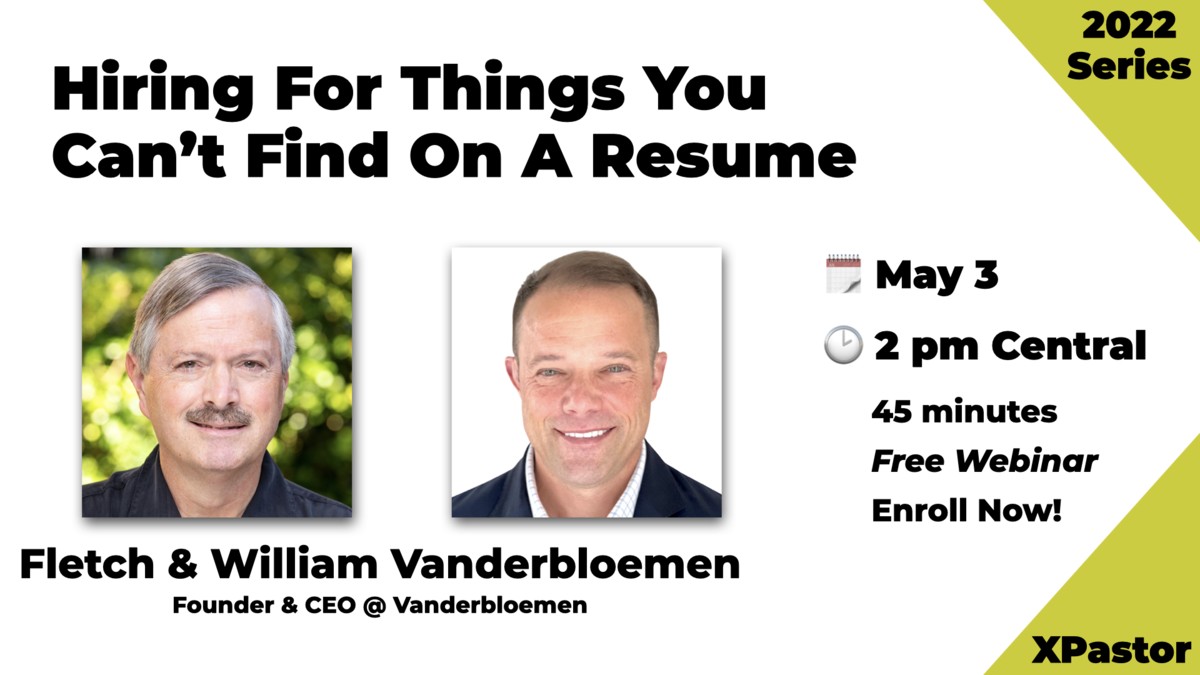The church is not properly educated when it comes to understanding what their options are in hiring a pastoral staffing firm. Until recently, there was really only one option: Retained Pastoral Search Firms. Understanding the secular staffing world may help you in making a better choice when hiring a firm.
My career started as a recruiter in the secular workforce for a technology headhunting company. As I advanced in my career, I was offered a position as the Director of Human Resources and reported directly to the company’s CEO. This allowed me to have a unique perspective. In the first portion of my career, I was selling recruiting services to HR executives. Then I was receiving sales calls from staffing firms as the Director of HR. As the Director of HR, my perception of staffing firms increased in value. I saw that these services were truly needed in my organization and the recruiters at these firms were worth their weight in gold.
About a year ago, God laid a vision heavily on my heart: Open a church staffing firm. I about fell out of my chair as I conducted research on the “pastoral staffing industry.” Every company that I came across was a retained search firm. I couldn’t believe it. Let’s take a look at the staffing industry in the secular world. This will help you understand why I was shocked when researching the church’s choices in hiring a pastoral recruiting firm.
Secular Retained Search Firms
It’s important to know that 6% of 22,000 secular staffing companies in the U.S. are retained search firms. A retained fee means that the client has to pay 33% of the anticipated salary on signing a retained search firm’s contract. For the sake of simple math, let’s say the anticipated salary is $100,000. This means that the client has to write a check for $33,000 just to get started! Most of these firms specialize in executive searches where they staff any given company’s President, CEO, COO, etc. The open position that the retained search firm is looking for usually has a minimum of a $250,000 annual salary. Typically, a retained search firm’s client is a fortune 500, multi-billion dollar company who has the resources and capital to hire a retained search firm.
The other resource that they have is time. These positions are almost always focused on vision and strategy. Retained search firms are excellent at finding that fit that’s just right. But the perfect fit usually takes an average of six months to fill. These companies are great in that they are extremely thorough with the candidates that they provide to their clients. If there is even a hint of doubt about fit, they won’t send them over to the client. They conduct a microscopic examination of their candidates. It’s a great option if you can afford to spare the large fee and the time that is lost to fill the position.
Secular Contingency Search Firms
The other 94% of secular companies are made up of contingency fee staffing firms. A contingency fee means the firm does not get paid a single cent until the candidate they recruited accepts an offer from the client.
The firm does an extremely focused search to find a candidate who matches their client’s requirement. They vet out unqualified candidates by intimately looking at their personality, values, communication skills and experience. These candidates typically go through a two-step process where they are first phone screened. If they move on from the phone screen, then they go to a face-to-face interview with the recruiter. If the candidate moves on from there, they are submitted to the client with a detailed synopsis on why the firm saw a potential fit. The client then has the choice on whether or not to interview the candidate. If an interview goes well and the client wants to extend an offer, they may do so. It is then up to the candidate if s/he wants to accept the opportunity. The contingency-based search firm is only paid when the candidate accepts the offer and completes a 90-day guarantee.
Is there something to be learned when a vast majority of the secular staffing industry is operating on a contingentcy model? Could this be a better model for the church and more advantageous for its leadership? I have to believe so.
-
Contingency fees allow the local church to recruit.
Jesus did not say, “Go and hire a pastoral staffing agency to make disciples.” No, the greatest recruiters in the world are in the church. A recruiter is simply a fisher of men. When you use a contingency-based staffing firm, you allow the possibilities of your network, tools and processes to fill the position. If that happens, you do not have to pay the firm a cent.
Many times we come across local churches who are currently engaged with a retained search firm. Often we hear sighs of frustration and “I wish we would have spoken sooner.” Most of their frustration stems from the fact that they have generated better candidates from their own personal network than the staffing firm. When a local church gets into this position, they feel stuck because they will lose out on the money that they paid the retained search firm. This forces them to forfeit the homegrown candidate they have received and accept whatever the retained search firm submits to them.
Recently we were working with a church in Iowa that hired us to source for a Campus Pastor opening. After working with them for several months, they were delighted to find that one of their regular attendees felt called to interview for the position. They hesitated to tell us what had happened out of fear that we would be angry because we worked so hard to serve them for the role. But we rejoiced with them. It’s for this exact reason that Churchology has a contingent model. It leaves room for the local church to recruit in their network and they are not forced to pay a fee if they don’t have to.
2. Contingency staffing firms work urgently to recruit talent.
The recruiters that source in these firms are usually paid a small base salary and are incentivized to earn commission by filling the position. Great recruiters recognize that it’s about quality and not quantity. They work hard and are extremely responsive to both clients and candidates. Being contingent incentivizes the team to earn their wages. It’s an incredible model that’s fair for both the client and the recruiter.
In the secular world, some staffing firms are known for a reputation that uses the “Spaghetti Method” for recruiting. They will throw any candidates (no matter if they are qualified) at their clients in hopes that one of them will stick. Firms that operate like this will not be in business long; you will usually see this sort of method from a green recruiter. Experienced recruiters focus on what they know about the client and what their needs are. That way, when they dish out a candidate, the client is completely satisfied and impressed with the provided talent. The character traits that you will find in successful contingent recruiters are resiliency, patience, creativity and resourcefulness. They must possess an amazing work ethic and are highly motivated individuals.
3. Retained staffing firms work urgently to close the sale.
Go to any retained search firm’s website and navigate to the About page. Then conduct a ratio of recruiting personnel against sales personnel. The firm’s sales team typically outnumber the recruiters 3:1. This means that the company focuses most of their energy on the sale. The top heavy sales-to-recruiter ratio has the potential to make recruiting services suffer. If the agency is focusing on sales, that means they’re constantly signing new business. New business means that they have more positions to fill. Some retained staffing firms have up to fifteen positions per recruiter! So naturally, some of these positions have been open for a very long time. Urgency then is focused on the sale … not recruiting.
This type of focus leads to this question: Why would a company recruit with urgency when they know that they’ve already been paid? This model allows the firm’s recruiting team to relax because they know that they have retained the position. However, this model does allow the firm to have the resources to get to know the client better than a contingency model. When a client pays the firm upfront, they then have the capital to be able to fly out to the site and do a full evaluation of the local church’s DNA.
Both of these models have their pros and cons; my goal here is to educate the leaders of the church on what options work best for them. I sincerely believe that these retained pastoral staffing firms are great companies. Most of them are reputable and have just followed suit to the industry standards that have been set. But we believe that the leaders of the church need to understand that there are choices now. The best choice for both the local church and the church as a whole is entirely up to you!
Recruiting data gathered from Bullhorn Reach North American Trends. Approximately 2,000 recruiting agencies were randomly selected and surveyed across all of North America.











